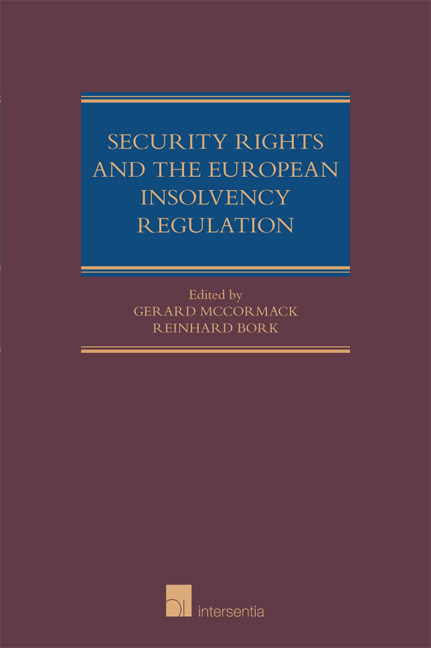Book contents
- Frontmatter
- Disclaimer
- Preface
- Contents
- Questionnaire
- Table of Cases
- Table of Abbreviations
- Part I Comparative Analysis
- Introduction
- Chapter 1 Security Rights under Article 5 of the Insolvency Regulation and Article 8 of theRecast
- Chapter 2 Transactional Avoidance and the Insolvency Regulation
- Chapter 3 Security Rights, National Laws and Possible Reforms
- Chapter 4 Transactional Avoidance, National Laws and Possible Reforms
- Part II National Reports
- Index
- List of Authors
Chapter 3 - Security Rights, National Laws and Possible Reforms
from Part I - Comparative Analysis
Published online by Cambridge University Press: 21 September 2018
- Frontmatter
- Disclaimer
- Preface
- Contents
- Questionnaire
- Table of Cases
- Table of Abbreviations
- Part I Comparative Analysis
- Introduction
- Chapter 1 Security Rights under Article 5 of the Insolvency Regulation and Article 8 of theRecast
- Chapter 2 Transactional Avoidance and the Insolvency Regulation
- Chapter 3 Security Rights, National Laws and Possible Reforms
- Chapter 4 Transactional Avoidance, National Laws and Possible Reforms
- Part II National Reports
- Index
- List of Authors
Summary
The previous chapters have highlighted the fact that security rights are considered to be vitally important and also the relatively privileged position of secured creditors in the context of the Insolvency Regulation and in particular Article 5 of the original and Article 8 of the recast Regulation. This chapter highlights the fact, however, that the law on security rights differs significantly between different Member States. These divergences may cause creditors to assess credit risk differently. Moreover, as a general proposition, EU Member States, including the States that form the subject matter of our study, do not score extremely well on the‘ getting credit’ indicator of the World Bank Doing Business survey. The chapter also considers how EU Member States fare in terms of other international indicators and asks how the relative positon of EU States might be improved in terms of the World Bank rankings. This leads on to possible reform measures and the question of convergence between the laws of Member States.
The chapter consists of three substantive sections. The first brief section sets the scene. It sharpens our consideration of the policy background and introduces the World Bank Doing Business project and the relatively poor position of EU countries on the World Bank rankings. The second section is far more extensive. It summarises the national reports on the state of the law on security rights in the EU Member States that form the subject matter of our study highlighting differences and similarities between these laws. It is divided into subsections as follows:
• terminology, legal families and EBRD‘s Core Principles and reform efforts in Central and Eastern Europe;
• basic features of credit and security laws;
• general features for the creation of security interests;
• enforcement of security interests;
• comparisons between countries.
The third section considers how the law in Member States measures up against international indicators such as the United Nations Commission on International Trade Law (UNCITRAL) Legislative Guide on Secured Transactions, the European Bank for Reconstruction and Development (EBRD) Model Law on Secured Transactions and the World Bank indicators.
- Type
- Chapter
- Information
- Security Rights and the European Insolvency Regulation , pp. 61 - 120Publisher: IntersentiaPrint publication year: 2017



